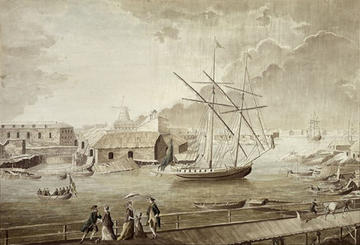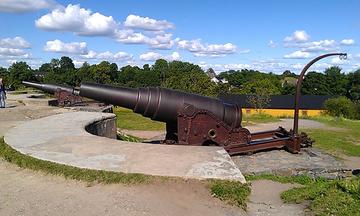The Business of War in the Baltic Sea Region
The business of war, meaning the commercial supply, financing and organisation of soldiers and materiel for armies and navies, was one of the predominant economic sectors in early modern Europe. This was a turbulent period, with civil unrest and wars the norm rather than the exception. Warfare itself was in transition, requiring ever more manpower and expensive new technologies. In response to these challenges - and opportunities - many rulers and other powerholders turned to the private market to provide the necessary military resources, from swords, armour and provisions to warhorses, ships and military professionals. While some resources could be acquired locally, the bulk were obtained through transnational networks of merchants and military enterprisers, making this a pan-European and even global system.

Painting of a pojama in Artilleriviken (Tykistölahti) at Sveaborg in Finland by Adolf Geete, 1760
The past two decades have seen a growing appreciation towards this large economic sector, and a steady increase in scholarly attention to its diverse facets. With regards to the Nordic countries, the research field remains segmented and dispersed, however. To address this, a group of researchers from the University of Helsinki brought together scholars working in the field of early modern business of war with topics specifically on the Baltic region for an exchange of ideas. The aim of this two-day workshop organised by the University of Helsinki on 26 and 27 October was to bring together these scattered groups researching the military markets of Northern Europe and the Baltic Sea Region, and provide a forum to present the latest research outputs in the field. A number of scholars answered the call, and over these two days we heard sixteen presentations covering various facets of the early modern business of war.
The early modern period in the Baltic was characterised by both nearly constant warfare in which at least one of the Baltic powers (usually Sweden of which Finland was also an important part) was involved and/or organising campaigns. As an important region of production and especially trade, commerce continued across the Baltic Sea and also with Western Europe despite these on-going conflicts. In particular, the connections between Swedish, Scottish, and Russian territories and the inclusion of other actors from within and from outside the Baltic were discussed during the workshop, and highlight the role of the Business of War not just for the region, but for early modern European warfare and business of war in more general.
To kick off the workshop, Professor Steve Murdoch (Swedish Defense University) gave a keynote speech regarding the significance of the international arms trade and transnational military networks for the Wars of the Three Kingdoms. In the years 1638–1641 Scottish veterans, who had formed important connections in Sweden, Denmark and the Holy Roman Empire, were instrumental in procuring weapons for the Covenanters opposing Charles I, while using their influence to deny crucial support to the king. As this presentation demonstrated, the military economy was a transnational system. Military, mercantile and political spheres were closely interlocked, and access to key intermediaries directing these networks could have a profound impact on the course of European wars, and historical developments more generally.
This keynote set the stage for the rest of the workshop, which was divided into four sessions devoted to various facets of the business of war. The theme for the first session was Merchants, suppliers and civil-military relations. In this category we heard very interesting presentations by Mika Mickelsson (University of Turku) on the international arms trade practiced by Louis De Geer (1587–1652), and by Ulla Ijäs (University of Tampere) on the entrepreneurial practices of the Hackman family in providing victuals and timber to the Russian navy, and stone materials for the construction of fortifications in the eighteenth century. Katarzyna Wagner (University of Warsaw) had analysed the Swedish contributions system during the Second Northern War (1655–1660) and provided interesting findings on the scale and significance of the "fire tax" (brandskatt) forcibly collected from the inhabitants of Warsaw. Adopting a more prosopographic approach, Adam Grimshaw gave a presentation on English merchants in Sweden, the development of Anglo-Swedish commercial relations and the procurement of naval supplies for the growing English navy during the Interregnum era (1649–1660).
The focus of the second session was an ongoing project by Patrik Winton (Örebro University), Peter Ericsson (Uppsala University) and Oleksandr Turchyn (Uppsala University) titled The Resource Nexus: Global Flows, Military Supplies and State Capacity in the Baltic Region 1740–1815. Looking at the Swedish contractor state in action, Winton and Ericsson presented their findings on Swedish expenditure during the Russo-Swedish war of 1741–1742 and the Seven Years' War, respectively, showing how preparation for war created global resource flows that could have a stimulating effect for the economy and helped develop Swedish financial institutions. Oleksandr Turchyn focused on the contractor state's performance "in the field" during Swedish operations in Pomerania 1756–1763. According to Turchyn, logistical challenges confounded centralized supply systems, meaning that the field army had to complement state-negotiated contracts by making ad hoc agreements with local entrepreneurs. Finally, Henri Aaltonen from the University of Helsinki presented findings from a separate Finnish project, showcasing how religious institutions can be instrumental in creating state capacity by lowering transaction costs in resource extraction for war.

Guns of Suomenlinna
The first session on Friday was titled Military entrepreuneurship, migration and recruitment. Sebastian Schiavone (University of Eastern Finland) demonstrated the significant role played by William Cahun's Scottish company as a gateway for Scottish soldiers to enter Swedish service in the sixteenth century. My own presentation charted the military entrepreneurship of Count Jacob De la Gardie, commander of Swedish forces occupying Novgorod during the Ingrian war 1609–1617, while Björn Forsen (University of Helsinki) enlightened us on the little known, yet surprisingly large contingent of Swedish mercenaries who fought in Venitian service towards the end of the seventeenth century. Finally, Jouko Hartikainen (University of Helsinki) discussed another understudied facet of military entrepreneurship – the economic impact of Swedish privateers operating from Stralsund and Dunkerque during the Great Northern War (1700–1721). These privateers were made the target of British royal propaganda, aimed at fomenting anti-Swedish sentiment in order to further Hannoverian aspirations for annexing Bremen and Verden from Sweden, which again demonstrates the connectivity between commerce, warfare and international politics.
The final session looked at Military networks and information flows. Martin Neuding Skoog (Swedish Defense University) opened an interesting new avenue by exploring Swedish intelligence networks during the reign of Gustav Vasa (1523–1560). Information was a valuable commodity, and the king maintained a network of agents across the Baltic Sea Region to facilitate recruitments, but also to monitor for potentially hostile military buildups aimed against Sweden. For her part, Cathleen Sarti (University of Oxford) presented a macro-level overview of what data collected from the Sound Tolls can tell about the military market to and from the Baltic Sea Region over a 300-year period. Finally, to end the workshop, Professor Anu Lahtinen (University of Helsinki) outlined her own project to create a digital map of the early modern road network in Finland which, together with the broader Viabundus project covering other territories surrounding the Baltic Sea, will provide a key resource for charting the supply infrastructure and logistical hubs of the early modern military market.
These presentations and subsequent discussions highlighted the diverse aspects and prevalence of the business of war in the Baltic Sea Region. It is clear that resource mobilization was a complex process requiring diplomatic, economic and military endeavours to succeed. The role of private contractors remained central for military supply throughout the early modern period, which rulers sought to facilitate by creating strong and often personal bonds with key intermediaries of these transnational fiscal-military networks, but also by developing institutional capacity to monitor and co-ordinate these efforts. Moving forward, the plan is to develop these themes and topics into an open-access anthology, which is expected to come out in 2025.
Jaakko Björklund is a Doctoral Researcher at the University of Helsinki. His doctoral thesis investigates military entrepreneurship and military migration to Sweden at the start of the seventeenth century.


